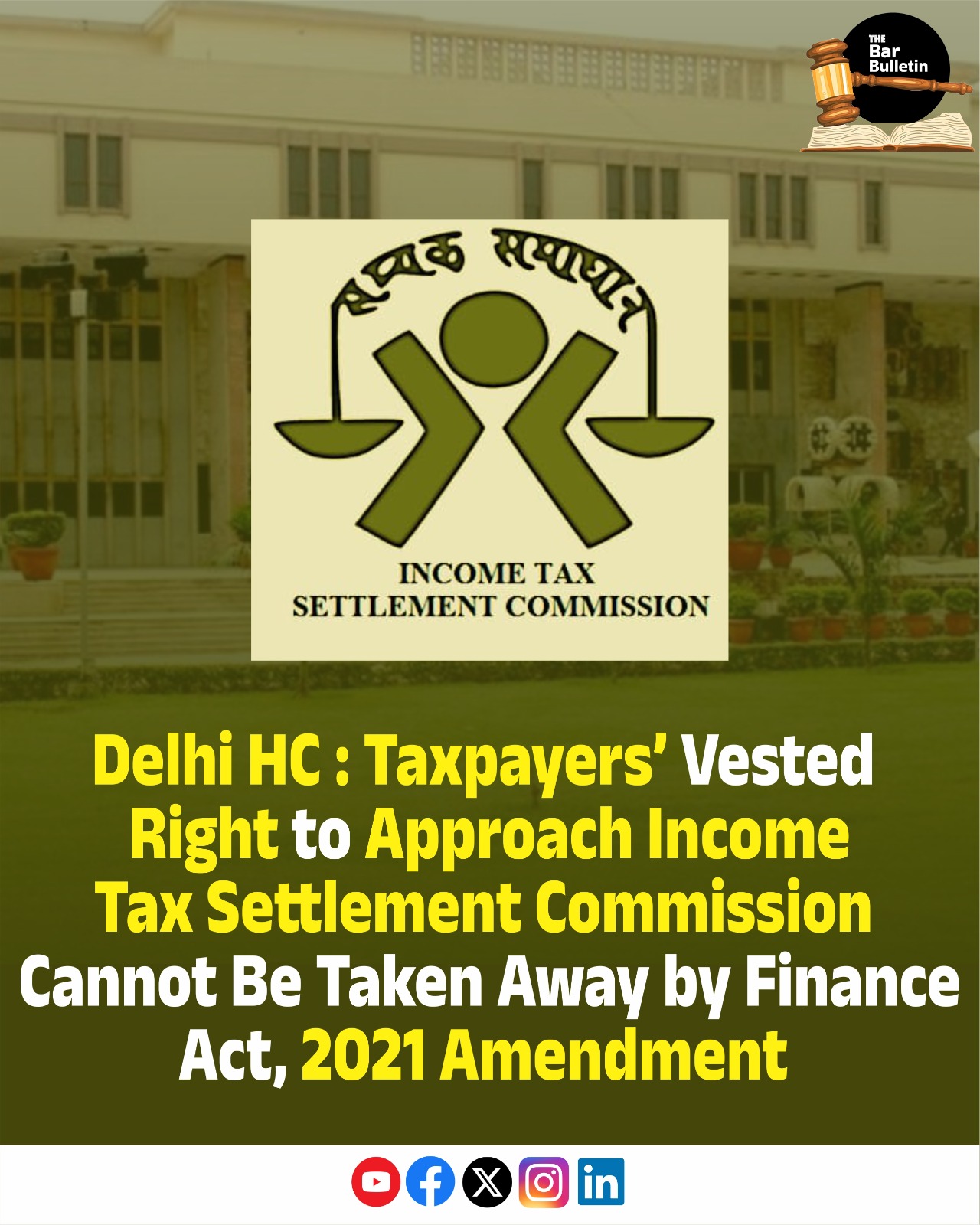The Delhi High Court has ruled that the Income Tax Settlement Commission (ITSC), being a creation of a statute, the taxpayers do have a statutory right to approach the same, seeking a concession. Though the orders of the ITSC may have the trappings of a concession, the same is exercised by the State through a statutory scheme, and whether or not the concession is granted, the taxpayers are, in fact, vested with a right to apply for the same to the ITSC.
The Court held so while referring to the Press Release dated September 07, 2021, and the subsequent order under Section 119(2)(b) of the Income Tax Act dated September 28, 2021, wherein it was clarified that the taxpayers, who were eligible to apply for settlement on or before January 31, 2021, but could not file the same due to the cessation of the ITSC, could file their applications till September 31, 2021 before the Interim Board.
The Court clarified that since such a Press Release was purportedly passed to relax the rigors of a statutory provision, it could not have merely extended the time limit for filing an application while simultaneously denying the benefit of such extension to a class of taxpayers. That apart, the purpose of the amendment being to make ITSC inoperative and bring the pending applications before the Interim Board, it cannot be said that the legislature had any intent to do away with pending applications in respect of cases that arose between February 01, 2021, and March 31, 2021.
The Court therefore allowed the petitions in favour of the taxpayer and directed that the settlement applications filed even after February 01, 2021, and on March 22, 2021, shall be treated as pending applications to be considered by the Interim Board. The Court also stayed the notices issued under Sections 143(2) and 142(1) till the applications are decided by the Interim Board.
The Division Bench comprising Justice V. Kameswar Rao and Justice Vinod Kumar observed that the power of the Parliament to enact Amendment Acts with retrospective application cannot be curtailed. However, the ITSC being a creature of statute, Section 245C of the Income Tax Act grants a vested right to the taxpayer to have their applications decided. The Bench, therefore, asserted that such rights of the taxpayer cannot be taken away in the absence of any express words or necessary implication in the Finance Act, 2021, to that effect.
The Bench added that the order dated September 28, 2021, limiting the extension of time for filing the settlement application to only those taxpayers who were eligible to file applications as on January 31, 2021, is bad in law, and even the settlement applications filed between February 01, 2021 and March 31, 2021 are held to be validly filed and need to be decided.
Reference was made to the decision in the case of Jain Metal Rolling Mills v. Union of India [(2024) 461 ITR 423], wherein the High Court of Madras held that the act of the State in abolishing the ITSC with effect from a cut-off date per se cannot be illegal or ultra vires the Constitution of India, and has read down the last date mentioned for filing applications in Section 245C(5) as March 31, 2021.
Briefly, in this case, the petitioner, engaged in the business of execution of large-scale EPC/Turnkey Water Management Projects, was subjected to a search and seizure by the Income Tax authorities, resulting in the issuance of notices under Section 153-A. Accordingly, the petitioner hired a consultant to prepare its application under Section 245-C to be filed before the ITSC. Later, the petitioner then learnt that, in light of the provisions of the Finance Bill, 2021, the ITSC was not accepting any such application, and therefore, approached the High Court, which directed the ITSC to accept and process the application, as the Finance Bill, 2021, had not morphed into a statute as of that date.
Pursuant thereto, the petitioner applied Section 245-C along with an amount of ₹’30.04 crore by way of tax and interest on the income disclosed in the said application as statutorily required. The petitioner also informed the AO about the application before the ITSC. However, no action was taken by the ITSC despite the Court’s direction, and rather, notices under Section 143(2) & 142(1) were issued. In the meantime, since the Finance Bill 2021 received the Presidential assent, the petitioner filed an amended petition seeking direction to the Respondent to receive the application under Section 245-C, and process the same as per Chapter XIX-A of the Income Tax Act.
Cases Relied On:
Jain Metal Rolling Mills v. Union of India – (2024) 461 ITR 423
Sar Senapati Santaji Ghorpade Sugar Factory v. ACIT – 2024 SCC OnLine Bom 981
Union of India and Ors. vs. Aayana Charitable Trust & Ors., W.A. Nos. 2042, 2106 of 2024
Appearances:
Senior Advocate Parag P. Tripathi, along with Advocates Sanam Tripathi, Srinivasan, Ramaswamay, Dheeresh K. Dwivedi, and Harjeet Singh, for the Petitioner/ Taxpayer
Advocates Sanjay Kumar, Monica Benjamin, and Easha, for the Respondent/ Revenue

